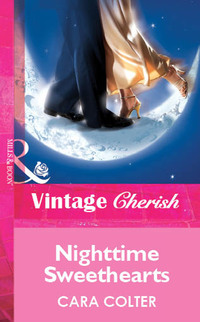Książki nie można pobrać jako pliku, ale można ją czytać w naszej aplikacji lub online na stronie.
Czytaj książkę: «Nighttime Sweethearts»
Magic was one thing. Miracles were quite another.
Merry felt her first shiver of doubt. Rick was wounded, and he didn’t like romance. But there was something about him that made her want to see love transform his life.
And then, suddenly, he went very still beside her. Intrigued, she followed his gaze. He stared with his eyes narrowed to a hard squint at Cynthia Forsythe.
Merry started at his deep growl. Every hair on the back of her neck rose up. “You know Cynthia?” she asked.
Something in his face closed and became colder than ice. “I did,” he said. “A long time ago.”
“I’d be happy to reintroduce you!”
The look he gave her could have stripped paint. “No,” he said. “In fact, I’d thank you not to mention me to her.”
Merry’s heart pounded hard. What could be more perfect? Her last couple—a love-gone-wrong-and-now-made-right story! But a glance into the cast stone of his face made her wonder if even magic could change what she saw there.
Nighttime Sweethearts
Cara Colter
To Judy and Charles Moon
in gratitude for all you do
CARA COLTER
shares ten acres in the wild Kootenay region of British Columbia with the man of her dreams, three children, two horses, a cat with no tail and a golden retriever who answers best to “bad dog.” She loves reading, writing and the woods in winter (no bears). She says life’s delights include an automatic garage door opener and the skylight over the bed that allows her to see the stars at night.
She also says, “I have not lived a neat and tidy life, and used to envy those who did. Now I see my struggles as having given me a deep appreciation of life, and of love, that I hope I succeed in passing on through the stories that I tell.”
The Tale of the Bear Who Married a Woman
[Source: Franz Boas, Tsimshian Mythology (Washington, D.C.: United States Government Printing Office, 1916.)]
Once upon a time there lived a widow with a beautiful daughter. Many men asked for the daughter’s hand, but the widow declined them all. The mother wanted a son-in-law who had the hands to build a solid canoe. So her advice to her daughter was to feel her suitors’ palms. “If they are soft, decline him. If they are rough, accept him.”
Her daughter obeyed and refused to be wooed by any of the young men. Until one night, a man came to her bed. She tucked her hands in his and found his palms to be very rough, so she accepted his proposal. Early the next morning, however, he had disappeared. She had never even seen his face. But in front of the house was a tasty fish, left for the girl and her mother.
The girl, her mother and the young man who visited only at night lived this way for some time. The young woman never saw her husband, but every morning she found an animal at the door, each one larger than the last. Because of the animals, the widow became quite rich.
But the widow was eager to see her son-in-law, so one day she waited until he arrived. What she saw was a red bear emerging from the water. He carried two whales, but as soon as he noticed the widow looking at him, he was transformed into a rock, which may be seen up to this day.
Contents
Prologue
Chapter One
Chapter Two
Chapter Three
Chapter Four
Chapter Five
Chapter Six
Chapter Seven
Chapter Eight
Chapter Nine
Prologue
“Ms. Montrose?” Her secretary paged Merry over the office speakerphone. “Rick Barnett is here to see you.”
“Who?” Merry asked, not even trying to keep the edge out of her voice. She did not have time for anyone right now.
“He’s the architect. The one you’ve chosen to build the chapel?”
Oh, yes, the architect. The chapel was the brilliant idea Merry had conceived. Given the amount of romance blossoming at La Torchere resort, where she was a manager, they should have an on-site chapel. People could plan to have weddings here. The resort’s owner had been thrilled with her idea, naturally, and had given her the go-ahead via correspondence to look after all the details.
At the time, Merry had been quite pleased with the success of her idea. Now it seemed like small potatoes, compared to what was going on in her real life.
She had to play matchmaker for only one more couple, and the spell that had been placed on her almost seven years ago by her well-meaning—but nonetheless wicked—godmother, Lissa, would be broken!
Broken, broken, broken. She would go from being this wrinkled, bony, gray-haired old crone back to her gorgeous, young self. Closing her eyes, she remembered what she had once looked like: the flawless skin, the waves of auburn hair, the beautiful figure she had taken so for granted.
Yes, Merry Montrose, aka Princess Meredith Montrosa Bessart, was one match away from being restored to her former fabulous life. Not that managing this very exclusive island resort off the coast of Florida didn’t have moments so rewarding they took her by surprise, but, really—life as a resort manager or life as a princess? The choice was a no-brainer!
She indulged in a moment’s daydreaming. She would be welcomed back to the kingdom of Silestia. There would be parties and celebrations in the streets. She would once again have her life of luxury. She would marry the prince she had been promised to at birth, and their union would provide fabulous business opportunities and contracts. There would be glory and glamour, as was befitting a princess.
But enough daydreaming! The curse had required she match twenty-one couples before her thirtieth birthday. Couple number twenty—that delightful sheik and the lovely Selina Carrington had fallen head over heels for each other—just as Merry had planned. Couple nineteen, Brad Smith and Parris Hammond, were marrying right here at the resort next week.
Time was of the essence now. Only weeks to go before Merry turned thirty. Only one couple left!
Now was not the time for dilly-dallying, but Merry found herself wasting precious moments fretting over who to match. If it was going to be her last effort, she wanted it to be absolutely perfect. Stacks of papers and files and photographs littered her desk as she debated whose lives to meddle in.
“In the loveliest way, of course,” she muttered, holding up a photo of a stunning actress, a regular at La Torchere. “Well beyond her prime,” Merry noted, though not unkindly. She shuffled her photos like cards in a deck and came to La Torchere’s gardener, also beyond his prime. Was it possible?
“Ms. Montrose?” the secretary’s voice came again, uncertainly, over the speakerphone, “Should I send him in?”
“Oh, if you must,” Merry said crabbily and slammed the intercom button with the palm of her hand. She put the actress and gardener aside and picked up a photo of an award-winning nuclear physicist and a belly-button-flaunting rock diva. “Too big a stretch,” she decided unhappily.
There was that new handyman on the place. Gorgeous. Blond, blue-eyed, the build of a Greek god…
A shadow fell over her, and she looked up. The photos fell from her fingers. “You must be Rick Barnett,” she said, her annoyance at this disturbance forgotten.
It’s him, she decided, feeling a smile starting inside. So, fate had opted to help her with her final match. It had given her the man, now all she had to do was find the woman. She got up and took his hand, felt the strength in it and the crackle of his fate joining hers.
Merry studied the young man in front of her with avid interest now. The pure power of his build was enough to take a girl’s breath away. He was massive at the shoulders, narrow at waist and hips and—she snuck a look as he turned to find his chair—his butt was spectacular.
Once, she could tell, he had been an extremely handsome man. Dark thick hair fell over his brow. His features—forehead, chin, nose, jaw—were chiseled perfection. But now a black patch roguishly covered his left eye and a network of scars, puckered and purplish, ran down the left side of his face. His face was a study in contrasts, one half perfect, the other imperfect, as if the man himself was split in two, light and dark.
“Construction accident,” he said, before she could ask.
His voice was like gravel, flat and harsh, a voice that invited no intrusion into his private world and wanted no sympathy. Nonetheless, Merry heard and, glancing up, saw in the dark, ocean blue of the right eye that glared at her—Rick Barnett was a man in pain.
It startled Merry how completely she understood his situation. Had she not been transformed herself? From a woman so beautiful she put the stars to shame, to this? A bony, homely, horrible old crone?
The difference was that she had a chance to break the curse that had been put on her. The man who sat before her was transformed for life, and he looked to be in his mid to late twenties.
The young female rock star? she asked herself, surreptitiously moving the photo back into her range of vision.
No. It would take the most special of women to see beyond surface appearances. Not the rock star, she decided, shuffling that photo to the bottom of the stack.
She studied him carefully and was able to see what had not been taken from him, but what had been given to him. Oh, yes, his looks had been shattered, but she had the sudden sensation of seeing his heart.
Formidable strength, enormous pain and, under it all, an amazing capacity for love.
Love.
It was all she could do not to burst into song. She realized she must be smiling at him with far too much enthusiasm, because he looked at her suspiciously and then got up from his chair and wandered restlessly over to the window.
Merry watched how he moved, fluid, an athlete, and felt a sigh inside of her. She got up and joined him at the window.
“There are a number of possible sites,” she said. “That’s one over there, by the pool. We want the chapel to be a small, very tasteful building. La Torchere seems to inspire romance.” Especially recently.
He grunted at that, letting her know exactly what he thought of romance.
“The new owner has agreed with me that offering an entire wedding facility here would be an aesthetic plus for the resort.”
“Not to mention financially lucrative?” he asked.
Cynical, Merry thought, and felt her first shiver of doubt. The man was wounded, and he didn’t like romance. Magic was one thing. Miracles were quite another.
“I’m interested,” she said carefully, “in why you would agree to do a job like this? Something so small? Your reputation, naturally, made me think you would refuse so humble a job.”
He was studying the possible building site she had pointed out. If she had hoped his answer would reveal something she could use to find him a match, she was disappointed.
“I needed a break from the pressure of big jobs,” he told her.
“Oh,” she said, her mind whirling. Maybe he wasn’t the one. Maybe she had just leapt to that conclusion. Maybe the actress and the new handyman. She felt a certain reluctance to match up the new handyman.
What was that about?
But before she could consider it further Rick Barnett turned from the window. The hard light in his eye softened. “I felt oddly compelled to be here.”
Merry tried not to gasp out loud. Oh! Then it was him! But who would she pair him with? She wanted to hustle him out of her office without ceremony so she could go through her files. She felt a most delicious sense of warmth beginning in her belly.
And she realized, amazed at herself, that it was not completely because she was so close to breaking the curse.
No, there was something about this man, that made her want to see love transform his life. Suddenly, he went very still beside her, as if he had stopped breathing.
Intrigued, she went to his side and followed his gaze. He was staring, his eye narrowed to a hard squint, at Cynthia Forsythe, one of the guests whose files Merry had pored over earlier. She would be an ideal candidate for a match—she was young and beautiful and personable.
Except her mother, the famous historical writer, Emma Bluebell Forsythe, had cornered the matchmaking market for her daughter. The woman was intent on finding the perfect mate for Cynthia…and she was utterly insensitive to the fact that her daughter was not interested.
“Cynthia,” he said.
Merry started at the deep growl that came from the man beside her. Every hair on the back of her neck rose up.
“You know her?” she asked.
Something in his face closed and became colder than ice. “I did,” he said, “a long time ago.”
“I’d be happy to reintroduce you!”
The look he gave her could have stripped paint. “No,” he said. “In fact, I’d thank you not to mention me to her.”
Merry’s heart was pounding hard. What could be more perfect? Her last couple—a love-gone-wrong-made-right story!
But a glance into the cast stone of his face made her wonder if even magic could change what she saw there.
Still, she had a soft spot for him, the man who, like her, had been transformed, but unlike her was not ever going back to what he used to be.
How strong was her magic? Dare she waste it on this couple who were far from a sure thing when her whole life was at stake?
She sighed. Oh, how she had cursed this spell that had been put on her. How she had railed against it and wallowed in self-pity over it.
But, ever so reluctantly, Princess Meredith Montrosa Bessart, aka Merry Montrose, realized a truth. She had become a better person than she had been before.
Because, for just the briefest moment in time, just long enough to make up her mind, she was able to put the future happiness of two other people ahead of her own.
Rick and Cynthia it is, Merry decided, and began humming the wedding march. Naturally, he thought she was inspired by the imminent arrival of the new chapel, designed by him, but he winced nonetheless.
Chapter One
“No.”
Cynthia Forsythe marveled at the enormous power of that small word. She said it to her mother, the famous writer Emma Bluebell Forsythe, rarely, and she expected to feel guilty, saying it now.
Instead, she felt a delicious and rather wicked sense of delight.
Her mother, dressed in a Chanel gown with her hair dyed a new shade of dark brown, stood in the door between their adjoining suites.
“No?” her mother repeated, as if she might not have heard correctly. “Cynthia, of course you are coming. I’ve met a real live baron. From Germany. He’s only a year or two older than you and he is one of the world’s wealthiest industrialists! Isn’t that exciting?”
“No,” Cynthia repeated.
“It’s not exciting?” her mother said, her hazel eyes wide with bafflement.
Cynthia really didn’t think it was that exciting—no more exciting than the newspaper magnate, the oil tycoon or the banker, but she clarified. “No, I’m not coming out tonight.”
“Dinner is going to be exquisite, and I understand there is a show after that we really can’t miss. Oh, how I love it here at LaTorchere, Cynthia. It’s better than Tuscany, which I must admit was a bit of a disappointment. But this place is so exclusive and classy, and there are just oodles of well-heeled people here. You can’t miss it. You simply have to come!”
Cynthia was a trifle amazed to find she didn’t have to, and she wasn’t going to. She folded her arms over her chest and said that powerful little word again.
Her mother’s eyes filmed over with tears, but she was quick enough with her handkerchief that her makeup was not affected by the little cloudburst. “Why are you being like this?”
“Mother, I’m just tired.”
“That’s why this holiday is for you! I’ve worked you much too hard. I should have broken the Civil War into chunks, instead of tackling the whole thing at once. Now you’re exhausted, and unhappy, and it’s my fault. I am honor-bound to fix it.”
“No,” Cynthia repeated again. That heady word was proving absolutely addictive. It was true she did work hard. Her mother was known to the world as Emma Bluebell Forsythe, writer of historical volumes of nonfiction that consistently made the bestseller lists.
The research for each novel was meticulous, and Cynthia’s job also involved keeping her mother’s many social activities and obligations sorted out and scheduled.
It was true that as her mother’s personal assistant Cynthia was exhausted.
Unhappy? She supposed there was truth in that, too, though she didn’t feel particularly unhappy. She wasn’t sure when she’d last felt anything at all. She was going through her life like a wooden puppet, making the motions, dancing the dance, but strangely detached from the whole process.
“Mother, if this holiday is truly for me, could you just let me have some breathing space, some time to myself?”
“Well, of course, it’s truly for you,” her mother wailed, “but I’m the one who knows what is best for you!”
Cynthia closed her eyes. And tonight that was a wealthy German industrialist. Last night it had been the exceedingly boring, but rich, Maxwell Davies. Tomorrow, unless she put her foot down, it would be Count Dracula if he was on vacation here and single.
There was a loud knock on her mother’s door, and then a deep, masculine voice called, “Bluebird, what on earth is the hold up?”
Cynthia opened her eyes to see Jerome Carrington coming though the door of her mother’s suite.
Jerome was a silver-haired dynamo whom her mother had recently met. He was the only one who could get away with calling Emma Forsythe Bluebird. The occasional very good, very old friend was allowed Bluebell, but no derivatives of the unusual name had ever been allowed.
“Good evening, Cynthia,” he said, and then turned to her mother with a stern expression on his handsome face. “You said that you would be outside my room at nine o’clock precisely, and here it is, nearly nine-fifteen.”
Her mother glared at Jerome. Not only was he the only one who called her Bluebird, he was certainly the only one who would have the nerve to reprimand her over such a small thing as fifteen minutes of tardiness.
Emma was a shrewd judge of character, though, and had obviously decided Jerome was not one to accept any form of excuse. Naturally, she blamed Cynthia for her lateness.
“It’s Cynthia’s fault,” she wailed prettily. “I’ve been standing here forever trying to talk sense into her. I have the most wonderful evening lined up for all of us, and she says she’s not coming. Jerome, talk to her!”
“All right,” he said, and he turned to Cynthia. She saw the loveliest spark of mischief in those steel-gray eyes. “My dear,” he said to her. “How old are you?”
“Twenty-six,” she replied.
“Hmm. Plenty old enough to be making your own plans for the evening. Bluebird?” And he crooked his elbow to Emma.
Emma sputtered and looked between him and her daughter and back to him. He did not remove his arm, but arched a questioning eyebrow at her.
“Oh,” she sputtered, “all right then. Cynthia, you and I will talk later.”
Much later, Cynthia hoped as she shut the door of her private suite on the departing couple. She looked around. She loved her rooms. They consisted of a small living area, an island kitchen, and a small alcove for dining. There was one bedroom and a bathroom. Outside, a patio with deep inviting deck furniture stretched the full length of the ground-floor suite, and both the bedroom and living room had French doors that opened onto that outdoor living area. It was separated from the public walkways by a bevy of gorgeous flowering shrubs and gardens. Beyond those gardens and pathways, in the distance, Cynthia could glimpse the endless blue of the sea.
The color scheme was serene and tropical. The furniture was not just beautiful, but also comfy and inviting. Everything at La Torchere Resort was a delight to the senses, including these lovely rooms that seemed to be awash in light and cheeriness.
Her own apartment at home did not give her this same sense of lightness. Of course, it was furnished with antiques, discards of her mother’s. Her own sofa was French Provincial in design, covered in a dark brocade. It was stiff and formal, not at all inviting like these furnishings. Had she ever put her feet up on it?
And her apartment building was in an area that her mother approved of. The historic district, of course, one block from her mother’s own home, a sprawling eighteenth-century mansion that had been in Emma’s family since it had been built.
But the delight Cynthia felt in her space at La Torchere made her suddenly aware of her own apartment’s deficiencies. The windows there were small, and the ceilings were too high. There was too much dark oak throughout. The furnishings were not her, for all that they were expensive and exquisite.
Here at La Torchere, she didn’t know why anyone ever had to go beyond the serenity of their own suite. Cynthia just wished she could have the vacation of her dreams—which was to have three good books to read and the time to read all of them—instead of having to contend with her mother’s agenda everyday.
And her mother’s agenda was matchmaking. Only the wealthy and successful need apply.
But rather than waste one moment of her hard-fought freedom thinking of that, Cynthia waltzed over to her suitcase and unearthed a well-hidden book that her mother would definitely call trashy. Moments later she had on a pair of comfy pajamas—a long-sleeved top and trouser bottoms. She made herself a cup of cocoa, plumped the pillows on the sofa and settled back with a sigh.
“This is the life,” she told herself. Through the doors that opened onto the patio outside her room she could hear the whisper of the sea and the chatter of night birds. A warm, fragrant breeze played across her body. She opened the book and settled into the guilty pleasure of reading all about Jasmine and her sheik.
But rather than soothing her, transporting her to another world, the book seemed to unleash a terrible restlessness in her, a yearning for a life that was not her own. It didn’t help that her mother had unearthed the fact that Jerome’s granddaughter had met a real live sheik right here at La Torchere, and they had fallen madly in love with each other!
After a few hours of trying desperately to enjoy her fantasy of a perfect evening, Cynthia tossed the book aside. Why was she reading when there was a real world outside her door, exotic and compelling, waiting to be explored?
Not her mother’s world of fancy nightclubs and five-star restaurants.
No, Cynthia felt drawn to a world of waves washing sand and flowers releasing their fragrance into the darkness.
She glanced at the clock and snorted.
“At midnight? Cynthia, really.” This was happening to her more and more. Even when her mother was not there, it was as if Emma’s words issued out of Cynthia’s own mouth!
Cynthia got up from the sofa, stepped over the discarded book, and went into the bathroom. She shut the door and studied herself in the mirror. The pajamas—a Christmas gift from her mother—hid whatever shape she had. Her shoulder-length honey-brown hair was pulled back carelessly with an elastic band, her hazel eyes stared back at her unblinkingly through her reading glasses.
“My God, Cyn,” she muttered to herself. “When did you become so pathetic? You are twenty-six years old and frumpy.”
Of course, with a little makeup she could highlight the sweep of her cheekbones and the generosity of her mouth. She could make her eyes look green or gold or brown. But why bother?
“Your idea of fun,” she reminded herself, “is an evening with a good book. You look exactly like what you are—a research assistant who has never had a real live adventure in her whole life.”
Only that wasn’t quite true. A long time ago, shrieking with laughter, her arms wrapped around the solid, muscled body of the most beautiful boy in the world, she had ridden behind him on a speeding motorcycle.
His eyes had been the most stunning color of midnight blue, and he’d had the most amazing smile. She’d met him at high school, the high schools in those old districts having an eclectic mix of rich and poor. And he’d been poor. From the wrong side of the tracks, though his humble home had been only a block or two from where she now lived.
It had been years since she’d allowed herself to think of him, and she did not know why she had thought of him now. She brushed away the memory, a tormenting mix of delight and pain.
Still, something lingered and increased her sense of restlessness.
What did a restless person do on this secluded island resort? She had not heard her mother come back yet. Should she go and join them? They would be dancing by now, her mother whirling and twirling like a woman twenty years her junior.
But Cynthia knew that kind of entertainment would not take away the restlessness she was feeling. It might make it worse, make her feel even emptier, as if she was an actress playing a role she could not quite get into.
She left the bathroom and went to the French doors that led outside. She intended to close them, suppress these out-of-character thoughts, cream her face and go to bed.
But with her hand resting on the door handle, she felt the pull of the night. It was incredibly dark out. She could hear the whisper of a restless ocean. And then, as her eyes adjusted to the darkness, she saw thousands of little lights in the sea, bobbing and dancing.
La Torchere had been named for these small phosphorescent sea creatures that lit up the waters around the candelabra-shaped island at night.
But tonight, it seemed those lights dancing playfully in a sea of darkness were calling her name.
“You can’t go swimming by yourself in the middle of the night. Alone. It would be reckless.”
Her mother’s voice, again.
But then Cynthia wondered exactly how reckless it would be. She was a strong swimmer. The only residents of the island were La Torchere’s well-heeled guests. In fact, the only way to arrive here was by private ferry or float plane. The employees lived here, too, but all of them seemed charmingly ancient and imminently harmless. The scary people—the kind her mother had warned her about her entire life—were back on the mainland.
If she was going to have an adventure, even a small one, this seemed like it might be the perfect place to indulge herself.
Quickly, before she could change her mind and come to her senses, Cynthia went into her bedroom and put on her bathing suit, an unexciting one-piece high-necked tank suit.
“At least I do have a figure,” she muttered to herself, and then quickly slipped a cover over her body as if just having one was inviting temptations of the sort her mother did not approve.
She turned off all the lights so that if her mother returned to her suite next door she would think her daughter was sleeping. Locking the door behind her, Cynthia made her cautious way down to the flower-scented walkways that led to the beach.
Though late, the air remained as warm as an embrace. The gentle breeze lifted her hair and caressed her skin. The beach was, as she had known it would be, completely deserted. She went to the water’s edge, put down her towel, kicked off her shoes, and peeled off the swimsuit cover. The air smelled intoxicating, of the sea, of the night, of mystery.
Cynthia stuck her toe in the water and was greeted by more warmth. It was the first night of the new moon, and the night was so dark she could not tell where the water ended and the sky began.
She was utterly alone, and a new thought came to her.
Skinny dip.
It was ludicrous.
There was her mother’s voice again! But the truth was, Cynthia was not the type of woman who did that kind of thing, though she suddenly found herself pondering the type of woman who did. A rather enticing picture formed in her mind of a woman who was free-spirited, fully engaged in life, adventurous, laughter-filled, not so damned serious, not in the least bit tired or unhappy.
A woman who invited exactly the kind of temptations her mother disapproved of!
Ludicrous, her mother’s voice repeated within Cynthia’s own mind, and it proved to be the deciding factor.
All right. She would be ludicrous, then, and just a tiny bit reckless. She would give herself this small adventure—this break from convention—as a gift. Tonight, for a few minutes, she would be that free-spirited woman instead of Cynthia Forsythe, professional drudge.
Quickly, before she chickened out, squinting nervously into the impenetrable darkness, Cynthia shed her bathing suit. The night air was astonishing on her naked skin, tender and sensual.
She waded waist-deep and then dove. The water was even better than the air against her nakedness. It was warm and textured, as if she was embraced by liquid silk. Her body felt marvelous, as if it was humming. Cynthia laughed out loud. She became that light-spirited woman of her fantasies as she ducked and dove and swam and played amongst the tiny dancing lights of the sea creatures.
Finally, happy, she flipped on her back and floated in the sea of black—shiny black water meeting inky black sky with no boundary between the two. She imagined she was a star blinking brightly in a universe of darkness.
But she became Cynthia Forsythe again—fell back into her own body with dizzying swiftness—when she heard the slightest sound from the beach.
She lost the relaxation of the float, went under and resurfaced sputtering, her eyes stinging from salt water and her mouth full of the bitter taste. Warily, she turned her attention beachward.
She saw the distinctive flaring of a match, and then the glowing red tip of a cigarette. No, a cigar. The pungent aroma floated out over the darkness to her, rich and spicy.
Darmowy fragment się skończył.









